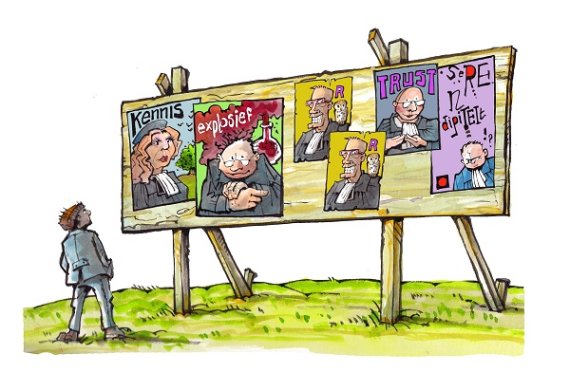Job Cohen,
Chair of the supervisory board ‘I am satisfied with the current procedure. On the executive board the rector represents the professors and thereby the advance guard for the university’s core business – the mix of education and research. These are things the rector knows about from his own experience and that makes him important for the university’s executives. ‘In our system a committee proposes a rector to the supervisory board and a committee from the WUR Council. Not only professors are represented but also students and general directors. All this is based on a procedure in which any of the professors can declare an interest in the post. I think that’s a scrupulous procedure.’
Gerlinde de Deyn,
Associate professor of Soil Quality ‘I think rector elections are an interesting idea. Elections increase staff and student involvement in management because candidates then have to give presentations about their goals. This means staff and students have to give it some serious thought: what are the duties of a rector and what capacities should he or she have? You’d get discussions on that during breaks and in the corridors. Perhaps you could start with an in-between format, with a committee drawing up a shortlist. I think an election like this fits well with One Wageningen because you bring together professors with some management drive. I’d say, give it a go.’
Sander Schalkx,
Student council member for VeSte ‘My immediate feeling is that an election is a good idea. It would make sure the rector had the support base he needs. In practice, however, people would just vote for the person they already know. So you will get a popular rector but a popular candidate is not necessarily a good rector. The academic community, students and staff, look at whether someone is approachable and stands up for student interests. But they lack sufficient insight into the specialist side of the job, such as lobbying government. In the end I think a specialized committee should make the choice.’
Masha van der Sande,
Chair of the Wageningen PhD Council ‘It is good to involve more people than just the committee in the appointment. I wonder whether it is useful for the whole university, including PhDs and students, to vote. Maybe you should restrict it to all Wageningen professors. I think voters need to have a good knowledge of the candidates and of the responsibilities of a rector. I would see an election primarily as extra information. The current system works well and takes account of the advice of representatives of PhDs, students and professors. But it could be good to broaden this a bit.’
Jan-Willem Kortlever,
Student council member for CSF ‘One wonders whether an elected rector is the best rector. An election might give you the most popular candidate, but it probably won’t be the person with the best profile. That is why we have entrusted the supervisory board and the WUR council with the task of choosing a rector. The WUR council represents students and staff and is the main place where you can have a say. If they draw up a good profile and someone is found who fits it, that person will represent the university better than someone voted for by a majority, based on their preferences.’
Noelle Aarts,
Personal professor of Strategic Communication and Teacher of the Year 2015 ‘In elections the circumstances mean that a different person is elected on one day than on another. The fads of the day can make it rather hit and miss. That strikes me as not very appropriate for electing a rector, when you want the best candidate. So I think the best candidate should be picked by a diverse committee, carefully and in several stages. Diversity is crucial: a lot of studies have shown that diverse groups make better decisions than homogeneous ones. So involve as many different people as possible and not just the mainly male professors.’
Charles El-Zeind,
Student council member for Sustainability and Internationalization ‘We are basically satisfied with the way it is done now, but the idea of giving students a platform where they can express their views appeals to me. This option won’t work, though, without well-informed students and staff members. Before you can elect a rector, I would want to see various things being further developed in the university, such as a broad system of participation. Once students are more involved in the governance and decision making at the university, it will be a good idea. Without this basis, an election for a rector would feel like it came from nowhere.’
Illustration: Henk van Ruitenbeek
Got your own idea about who should be the next rector? On resource-online you can read about how the rector is elected under the existing system. And Resource is on the lookout for the best man or woman for the job.







